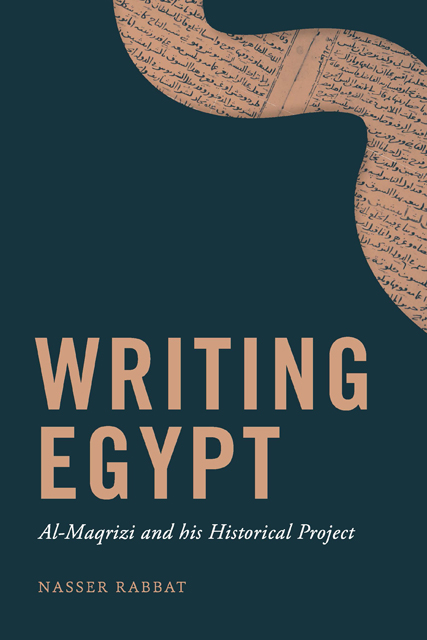Book contents
- Frontmatter
- Contents
- Preface
- List of Short References to Frequently Cited Primary Sources
- List of Abbreviations
- Notes on Transcription and Dates
- Introduction: A Singular Mamluk Historian
- Part 1 The Life of al-Maqrizi
- Part 2 The Writings of al-Maqrizi
- Part 3 The Afterlife of al-Maqrizi’s Writing
- In the Guise of a Conclusion: Becoming the Greatest Historian of Egypt
- Bibliography
- Index of Books Cited in the Text
- General Index
2 - Career, Moral Crisis, and Withdrawal
Published online by Cambridge University Press: 02 June 2023
- Frontmatter
- Contents
- Preface
- List of Short References to Frequently Cited Primary Sources
- List of Abbreviations
- Notes on Transcription and Dates
- Introduction: A Singular Mamluk Historian
- Part 1 The Life of al-Maqrizi
- Part 2 The Writings of al-Maqrizi
- Part 3 The Afterlife of al-Maqrizi’s Writing
- In the Guise of a Conclusion: Becoming the Greatest Historian of Egypt
- Bibliography
- Index of Books Cited in the Text
- General Index
Summary
When the Mamluks came to power in 1250, Cairo was still a city struggling to define its territorial boundaries and reassert its supremacy in the region after a chaotic century in which Jerusalem, Damascus, Aleppo, and other smaller cities rose to competitive positions under rival amirs of the Ayyubid clan or crusading princes. In less than a century, the Mamluks managed to transform the city not only into the undisputed capital of their formidable military empire, but also into the foremost Islamic metropolis of its time. In a building fury, sultans and amirs sponsored splendid mosques, madrasas, ribats, khanqahs, and mausoleums, endowing them as institutions of learning and Sufi piety. These structures lined up the major thoroughfares of the city, competing with one another to attract scholars and students or shaykhs and disciples. By the middle of the fourteenth century, Cairo had become the premier intellectual center of the Islamic world, a position that it managed to maintain for a couple of centuries.
The profusion of wealth and the excellence of institutions of learning in Mamluk Cairo attracted and sustained a large number of well-educated and motivated students and scholars who flocked to the city from all over Egypt as well as from faraway places such as Syria, Anatolia, Iran, Central Asia, India, al-Andalus, West Africa, and the Maghreb.Not unlike our modern-day top-notch university cities, Cairo offered its scholarly émigrés a myriad opportunities. Some came specifically to study with a famous professor who had established his seat of teaching in Cairo. Others hoped to profit from the abundant waqfs that supported the livelihood of teachers and students there.Still others were simply lured by the bountiful employment possibilities for all types of academic and religious professionals in well-endowed Mamluk religious institutions as well as in the Mamluk administration, which engaged a sizeable number of ulama in addition to the usual kuttab (sing. katib, scribe) who received their training at the diwan al-insha’ (literally the “bureau of composition” or the chancery).Better scholars who had proven their academic mettle publishing and teaching elsewhere were invited to assume prestigious positions in one or more of Cairo’s premier madrasas or in one of the four judiciary structures established by the Mamluks to represent the four Sunni madhahib.
- Type
- Chapter
- Information
- Writing EgyptAl-Maqrizi and his Historical Project, pp. 60 - 114Publisher: Edinburgh University PressPrint publication year: 2023

